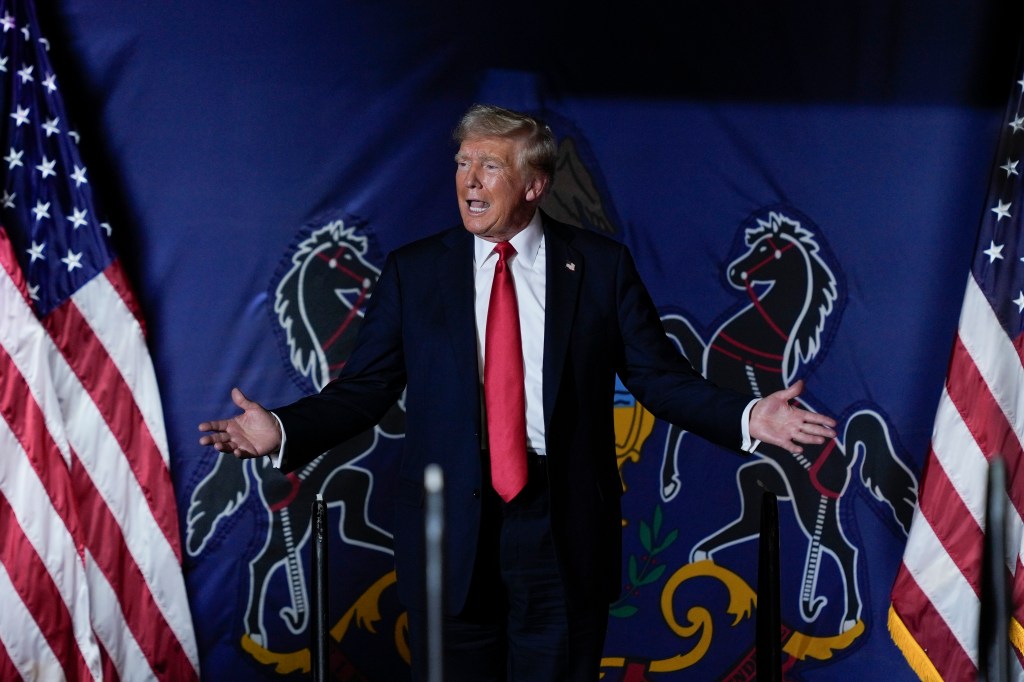At the Republican National Convention, we heard Donald Trump discuss an encounter with a Nevada waitress.
The swing-state server told her customer, the former president and Republican presidential nominee, of the onerous tax burden she felt from having to pay federal income tax on her tipped income.
There are some 300,000 hospitality workers in Las Vegas, many of whom receive tips. Many electoral roads to the presidency depend on winning Nevada. Trump is a savvy politician. A charitable view was that he was empathetic to a hardworking American in a restaurant; a less charitable view was that he saw a political opportunity.
Either way, it’s clear that the two major political parties in America have in many ways flipped. The Democrats, once the FDR-forged party of the working class, now have educated elites as their core constituency, which explains why President Joe Biden fought so hard to forgive student loans even for those making six-figure incomes, a blatantly inequitable giveaway that only encourages bloated campuses to raise tuition. By contrast, the Republicans badly need to appeal to blue-collar and lower-income voters, now their dominant group of supporters, especially in crucial states like Nevada, where they are the ones serving the vacationing Democrats. Ergo, Trump’s pledge to nix the taxing of their tips.
The waitress, he has said, was glad to hear this news. No doubt. But it’s a terrible idea.
If the plan went through, we’d all be watching a spectacle in which all kinds of income suddenly became categorized as “tips.” If you thought those pivoting iPads at the coffee shop with their suggested percentages were invasive now, you ain’t seen nothing yet. Everyone would try and become a tipped employee.
Imagine this scenario. A real estate agent offers to sell your house for 4% if you agree to “tip” your agent another 0.75% at the end of the deal and let him or her avoid taxes. Any business that has automatic gratuities (and there are many) would be upping their percentages and “lowering” their prices. Those tips added “for your convenience” would be showing up everywhere as people figured out how to manipulate the system.
Tipped employees work hard but so do nontipped employees, who often make far less. There’s no reason to eliminate taxation on a single category of income. Not only would it cost the treasury $250 billion, according to an estimate from the nonpartisan Committee for a Responsible Federal Budget, it’s fundamentally unfair.
People pay taxes on wages, commissions, royalties, rental property, capital gains, side jobs, business income, alimony payments, gambling winnings, court awards, dividends, gig work, stuff they sell online, retirement plan distributions, prizes and any number of other categories dreamed up by the IRS. Few of us enjoy the experience, and we’ve long been for people keeping as much of their hard-earned money as possible. But tipped employees can’t get some special deal. It’s wildly unfair, especially since the not-so-hidden secret here is that cash tips in particular already are easy to hide from the IRS.
But that’s just one of Trump’s problem-plagued tax giveaways. Another is his proposal to stop taxing Social Security benefits.
This one better passes the test of reasonableness. Democrats in Illinois, for example, have supported the state’s very popular policy not to tax retirement income at the state level. But the cost of Trump’s proposal would be astronomical. Once again, according to the Committee for a Responsible Federal Budget, the promise would reduce revenues by about $1.8 trillion between 2026 and 2035.
Presently, individuals earning less than $25,000 (and couples less than $32,000) of “combined income” (a complex term, but you get the idea) don’t pay tax on their Social Security benefits. Above that threshold, 50% of the benefit is taxable with the money going to the Social Security Trust Fund, where it is sorely needed. Once couples get above $44,000, another 35% becomes taxable, with that money going to the Medicare Hospital Insurance Trust Fund. Everyone knows that these safety net programs are already running out of money; removing at least $94 billion in revenue would make the situation exponentially worse.
Simply put, a future Trump administration, at least if it were behaving responsibly, would need to replace that revenue (or reduce expenses) before it moved to make such a move. A smarter idea would be to increase the tax threshold so that those who really depend on the benefits are able to enjoy it tax free; there is no reason to exempt those for whom the benefits, while justly earned, are just a small part of their retirement portfolios. Everyone knows that retirees are no worse off in today’s America than younger people; in many cases they are doing far better.
That brings us to the third of these Trump promises: reducing the federal corporate tax rate from 21% to 15%. We’ll allow this would be pro-growth; Trump has rightly said that his 2017 tax cuts that reduced the corporate income tax rate from 35% to 21% starting in 2018 encouraged companies to bring money “home,” so to speak, from international jurisdictions with lower tax rates. And it’s true that the U.S. has more state and local taxes to add to that bill than most of the nations with which it competes. But even though it was arguably a pro-growth tax cut (albeit pre-pandemic gross domestic product expansion was short of what GOP backers predicted), the change also reduced federal revenue by $1.47 trillion over 10 years, before accounting for that growth.
The latest Trump promise, the Tax Foundation estimates, would reduce federal revenue by another $460 billion over 10 years. That’s before growth, too, but it’s a risky roll of the dice, especially when combined with the other two ideas above. Fifteen percent looks too aggressive at this juncture to us, and it would put so much pressure on federal revenues that other pro-growth ideas (and there are other better pro-growth ideas) likely would get no oxygen whatsoever. And individuals would be vulnerable to compensatory tax hikes.
These kinds of promises to voters are, of course, grist for the mill in an election year when the results are expected to be very close.
Voters should not be easily seduced.
Submit a letter, of no more than 400 words, to the editor here or email letters@chicagotribune.com.




